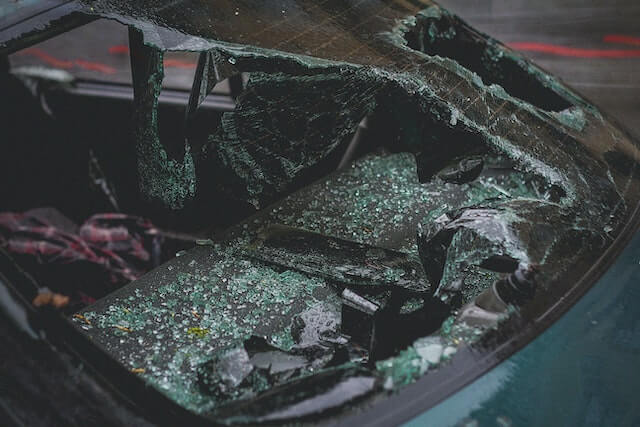
Rollover accidents are among the most dangerous and potentially fatal types of car accidents.
Those fortunate enough to survive a rollover often have severe injuries, many of which can be life-altering: broken bones, traumatic brain injuries, disfigurement, etc.. Rollover collisions are a small fraction of accidents on roads and highways, but they account for a large number of fatalities.
In 2020, almost 7,200 occupants of passenger vehicles died in rollover collisions. Notably, 76% of these fatalities involved a pre-rollover impact, but that means almost a quarter of the fatalities involved a vehicle rolling over without first colliding with an object or other vehicle. Rollover crashes accounted for 30% of all passenger vehicle deaths, with the majority of deaths being in single-vehicle crashes.
Rollover accidents occur when the vehicle flips onto its side or roof at any point. While any vehicle has the potential to flip, SUVs and trucks are more prone to flipping because of their high center of gravity.
Despite these harrowing statistics, not all rollover accidents are the same. Read on to learn about some of the most common rollover accident injuries and what contributes to a vehicle rolling over in a collision.
For a free consultation with an experienced Atlanta, Georgia auto accident lawyer, please call (770) 988-5252 or fill out our online form today.
Common Injuries from Rollover Accidents
Injuries in a rollover will vary depending on the circumstances of the accident. However, some injuries are more common than others.
Traumatic Brain Injuries
Traumatic brain injuries (TBIs) occur when the brain is subjected to a sudden jolt or impact, often due to the vehicle’s rapid change in motion during the rollover. TBIs can range from mild concussions to severe brain damage and can cause various symptoms, including headaches, dizziness, memory loss, and even permanent cognitive impairment. TBIs can be especially difficult to identify.
According to the Mayo Clinic, as symptoms may not appear until well after the actual injury occurs. It is important to be assessed for a TBI after any rollover car wreck.
Spinal Cord Injuries
The spinal cord is very delicate, leaving it vulnerable to severe injury in a collision. The forceful impact of the vehicle rolling over or the body being thrown around inside the car puts your spinal cord at a very high risk of serious injury. Spinal cord injuries can result in temporary or permanent paralysis, loss of sensation, and chronic pain. In severe cases, they can lead to a complete loss of motor function and independence.
Neck and Back Injuries
Neck and back injuries, such as whiplash, herniated discs, and spinal fractures, are frequent consequences of a rollover accident. Whiplash is common with many types of auto accidents. It occurs when the head suddenly jerks back and forth. This motion causes the muscles and ligaments in the neck to stretch beyond the normal range of motion. Whiplash can lead to pain, stiffness, and a reduced range of motion.
Chest Injuries
Chest injuries, such as rib fractures and lung contusions, are frequently seen in rollover accidents. The impact of the vehicle rolling over can cause severe chest compression, leading to broken ribs and damage to the lungs. These injuries can be excruciating and require surgery or other medical interventions to heal correctly.
Internal Injuries
Organ damage and internal bleeding can be life-threatening if not treated promptly. The force of the impact during a rollover accident can cause the organs to be crushed or punctured, leading to internal bleeding and potentially fatal complications. Immediate medical attention is essential to identify and treat these injuries. That is one of the reasons it’s crucial to get checked out after a rollover collision, even if you think you’re fine.
Lacerations and Abrasions
Broken glass, sharp metal, or other debris can be thrown around during the crash, leading to lacerations and other abrasions. These injuries range from minor cuts and scrapes to deep gashes requiring stitches or surgery. It’s crucial to clean and dress these wounds promptly to reduce the risk of infection and promote healing.
Fractured or Broken Bones
Commonly fractured or broken bones include the upper and lower extremities. The force of the impact can result in multiple broken or fractured bones. Proper treatment and rehabilitation are crucial for increasing your chances of a full recovery.
Emotional Trauma
While physical injuries are often the most visible consequences of a rollover accident, don’t overlook emotional trauma. Survivors of these accidents can experience a range of emotional reactions, such as shock, fear, anxiety, depression, and post-traumatic stress disorder (PTSD). Emotional injuries can have a long-lasting impact on your life, requiring counseling to help you cope with the aftermath.
Common Causes of Rollover Accidents
Rollover accidents can occur when a vehicle:
- Collides with an obstacle (e.g., uneven pavement, guardrail, or curb) that causes it to topple over;
- Overcorrects or executes a turn too rapidly or at a sharp angle for its current speed, resulting in a rollover (vehicles with a higher center of gravity are more prone to this type of rollover);
- Plummets down a slope or embankment; or
- Experiences a side impact in a multi-car collision.
- A vehicle has a flaw in its design or manufacture.
Driver Error
Driver error is the leading cause of most accidents, however-including rollovers.
Examples of driver error include the following:
- Fatigue or sleepiness,
- Distracted driving,
- Inattention (e.g., taking eyes off the road),
- Intoxication (due to alcohol, drugs, or prescription medications),
- Aggressiveness,
- Oversteering or overcorrecting,
- Driving too fast for the conditions,
- Inexperience behind the wheel,
- Overloaded or improperly loaded cargo (especially on an 18-wheeler), and
- Unfamiliarity with the road.
Other Situations and Factors
Additional factors and situations that may contribute to rollover accidents include:
- Narrow vehicle types that have a higher center of gravity, such as trucks, vans, and SUVs;
- Vehicles traveling at a high rate of speed, typically over the speed limit;
- Accident location, such as a rural road;
- Equipment failure, malfunction, or vehicle defect (such as a design flaw);
- Hazardous road conditions caused by bad weather, construction, or debris;
- Tire blowouts of defects; and
- Adverse weather conditions including rain, ice, high winds, or snow.
Vehicle Design Flaws
Examples of design flaws that could result in liability against the vehicle manufacturer include:
- Brake problems: If a vehicle’s brakes fail, the driver cannot stop the vehicle, making it more likely for them to lose control and roll over. Brake failure can lead to devastating injuries and property damage.
- Electrical issues: Defects with a vehicle’s electrical system can lead to all sorts of problems, including the inability to control the vehicle. Electrical issues are often the root cause of other problems, such as brake and steering wheel failure.
- Steering wheel malfunctions: A vehicle’s steering wheel can lock up and cause the car to remain in one trajectory. This can lead to the vehicle hitting something that causes it to hit or ramp over something and begin to roll.
- Tire failure: As one of the leading causes of rollover accidents, tire defects can be exceptionally dangerous. Tire failure often leads to blowouts, which frequently results in rollover crashes.
- Defective suspension system: All vehicles are designed to include a suspension system responsible for keeping them stable while on the road. If this system fails, a vehicle can become impossible to control, leading to a rollover.
While you can’t necessarily prevent every rollover accident, buying a vehicle with the most up-to-date safety system is crucial. Features like side-curtain airbags and electronic stability control are essential.
Contact a Georgia Rollover Accident Lawyer
If you need answers to questions like, What injuries can you get from a car rolling? please get in touch with MG Law today. Our skilled legal team knows the confusion and frustration that follow a rollover accident. These accidents typically involve complex legal questions. That’s because there may be multiple sources of recovery, especially in a vehicle defect case.
Our legal team has years of experience assisting injured victims and their families in seeking justice after a rollover accident. Contact our office online or call (770) 988-5252 today to schedule a free consultation.
Additional resources you may be interested in:
- What happens if I was in a single car accident?
- When is a pedestrian at fault for a car accident?
- What damages can I claim after a car accident?
- Recoverable damages after a car accident
- How long do car accident settlements take in GA?
- How to get a rental car after a car accident in Georgia?
- Who is liable in an accident involving a rental car?

